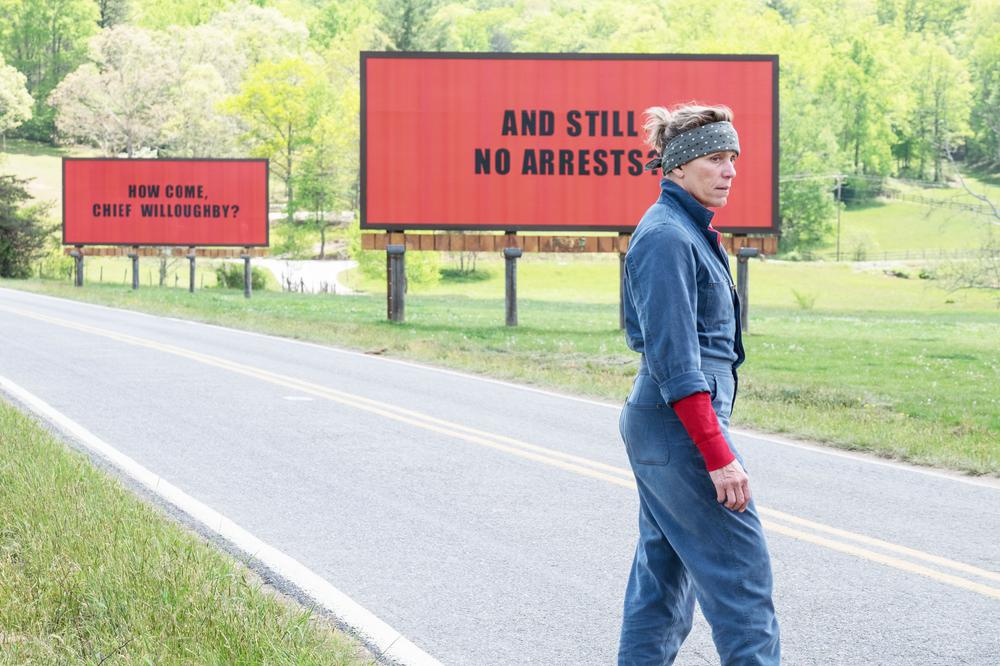Frances McDormand gives the performance of a lifetime by playing a grieving mother who challenges local authorities, her own strength, and the audience’s expectations in Martin McDonagh’s most recent tragicomedy.
If you’re looking for the standard cinematic equilibrium to satisfy your need for a happy beginning and ending, this is most definitely not it. However, if you are looking to feel something, a sense of belonging and recognition, or maybe a shared wanting of vengeance and justice, then take a seat. With the Oscar season rearing its all mighty head around the corner faster than you can say Three Billboards Outside Ebbing, Missouri, director Martin McDonagh has certainly stepped up his game with his latest film which treads a very fine line between comedy and drama, occasionally diving into both simultaneously in a uniquely controversial manner.
I must admit that my all-time favourite go-to for black comedy has to be anything written or directed by mastermind Quentin Tarantino… No explanation needed. However, it must be said that this is one of the greatest dark comedies I have seen to date.
Three Billboards is a film about vengeance, anger and acceptance, which takes place in the fictional southern town of Ebbing, Missouri, a place where life, happiness and hope go to die. At this point I would usually describe what the “plot” revolves around, however I don’t think the word plot is justified in this case. A “plot” normally entails a beginning which establishes a happy (or at the very least stable) situation, a middle which is tailored to disrupt the happiness and stability the viewer has enjoyed up until that moment, and an ending which is purposefully made to calm and resolve all issues, re-establishing the temporarily lost equilibrium and terminating the story on a high note.
So no, the use of the word “plot” to describe the events which take place throughout Three Billboards Outside Ebbing, Missouri, is not justified at all. The word I would use is that of a journey, an inward journey on behalf of not only the protagonist Mildred Hayes (Frances McDormand, but also of corrupt and racist police deputy Jason Dixon (Sam Rockwell).
Let me explain. The film is centred around the raw pain of Mildred Hayes, a mother who, months after her daughter’s rape and subsequent murder, questions the police about the lack of found culprits, and pays to have three billboards emblazoned with black lettering on a red background which read:
RAPED WHILE DYING
AND STILL NO ARRESTS?
HOW COME, CHIEF WILLOUGHBY?
These billboards act as cathartic instruments, allowing Mildred to feel that she is finally taking action by provoking a re-action. In fact, her efforts are proven to be successful within hours of the billboards being put up, attracting the attention of local TV news reporters, and authorities. Chief Willoughby, whom is directly quoted on the third and final billboard, is dying of cancer, and thus Mildred’s provocative attempts are thwarted by his indifference. The same cannot be said, however, for his racist deputy Dixon, who does everything in his power to get the billboards taken down.
Typography is everything here. With big bold black letters contrasted against the red background, the words convey the emotion behind the one who wrote them, raw anger and hurt. They symbolize the black hole inside Mildred’s soul which is full of anger and resentment. The bold characters are very much in-your-face, as a matter of fact they are in the whole town’s face. The billboards share Mildred’s voice, her anger and her demand for answers, the letters are sharp, concise, and to the point, reflecting Mildred’s powerhouse attitude throughout the film. The billboards are arguably a visual representation of Mildred herself, present through the entire film, they are burnt to the ground and built back up again, they rustle everyone’s feathers and most importantly they are cared for by Mildred herself, who plants three flower pots under each of them, to which she tends daily and which are pivotal in her moments of grief and reflection.
Mildred is a grieving mother and a force to be reckoned with, which certainly ties in well with 2018 being “the year of the woman”, and will most definitely place McDormand in the limelight for an Oscar nomination.
But Three Billboards isn’t just about the journey of Mildred Hayes, it also entails that of deputy Jason Dixon, a racist hick who lives with his verbally abusive mother and finds pleasure in torturing “black folk”. His character undergoes a 360-degree transformation, which remains remarkably believable throughout, going from an aggressive and poisonous man to someone with morals, who cares and, above all else, accepts. The point where Hayes’ and Dixon’s characters converge is the point where anger no longer consumes and destroys them, arguably constituting the “equilibrium” of the film.
If you are looking for the mystery to be solved, the murderer to be caught and everyone the inhabitants of Ebbing to live on happily, you have completely missed the point. Granted there are a few minor hiccups and unresolved issues, McDonagh skilfully manages to embed and tackle the roots of current modern day issues such as female abuse, racism and corruption all within 115 minutes… And that, ladies and gentlemen, is what I call genius.
McDormand makes the pain tangible to the audience, you feel her pain and her frustration as she feels them, but there is also an element of hilarity even on her behalf, a trait which makes her more human and relatable than any other character she has played thus far.
Beautifully shot and expertly written and portrayed, trust me when I say that this film is one to watch out for this coming award season.
